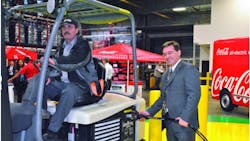Coca-Cola Deploys a New Fleet of Fuel Cell-Powered Lift Trucks
If there were any doubts as to the validity of the industrial fuel cell resurgence, they are settled with the announcement that Coca-Cola has recently deployed more than 50 hydrogen fuel cell units to replace traditional battery power in its electric lift truck fleet.
"Fuel cells are no longer a science experiment only intended for the lab. They are an economically viable power solution that can be utilized by customers to improve their business," said Gerry Anderson, CFO of Plug Power, a Latham, NY-based fuel cell producer.
The global resurgence of fuel cells has been driven by new innovations that have reduced the number of parts necessary for each unit, which has helped make them more reliable and more cost-effective. This translates to five key benefits to manufacturers converting to fuel cells, said Anderson.
Five key benefits to manufacturers converting to fuel cells
- Increased Productivity: Battery-powered lift trucks lose approximately 14 percent of their speed over the last half of the battery charge, but fuel cells maintain constant power at all times, keeping the vehicle running at full speed throughout the entire shift.
- Lower Operational Costs: Fuel cells eliminate the need to change, charge and manage batteries. The units run longer than lead-acid batteries and can be fueled in as little as 60 seconds, substantially reducing vehicle and personnel downtime.
- Zero Emissions: Fuel cells are safe, clean, and efficient. They produce zero harmful emissions and eliminate the costs associated with handling and storing toxic materials.
- More Commercial Space: Compact fueling stations replace large battery charging rooms, freeing up valuable warehouse space for other purposes.
- Transparent Transition: Fuel cell units like Plug Power's GenDrive fit seamlessly into the space occupied by batteries, making it a simple and cost-effective solution for customers to adopt.
Coca-Cola's new fleet will take over at the company's massive San Leandro, CA bottling and distribution center and promises to add new efficiency to operations there. "Fuel cells are [especially] attractive to material handling customers because they eliminate lead-acid batteries from the operation. Hydrogen fuel cells simplify the customer's operation and allow for better fleet predictability because they can be quickly fueled by the lift truck driver and run a constant speed for the entire shift, increasing truck productivity," said Anderson. Also, "the elimination of electrical charges incurred by the batteries brings the costs to run your operations down significantly."
As this resurgence plays out in factories around the world, continued improvements to the technology and further benefits of it will emerge. In the meantime, the technology will continue to play a major role in helping manufacturers reduce costs, improve efficiency and increase productivity and output, said Anderson.
About the Author
Travis M. Hessman
Editor-in-Chief
Travis Hessman is the editor-in-chief and senior content director for IndustryWeek and New Equipment Digest. He began his career as an intern at IndustryWeek in 2001 and later served as IW's technology and innovation editor. Today, he combines his experience as an educator, a writer, and a journalist to help address some of the most significant challenges in the manufacturing industry, with a particular focus on leadership, training, and the technologies of smart manufacturing.
